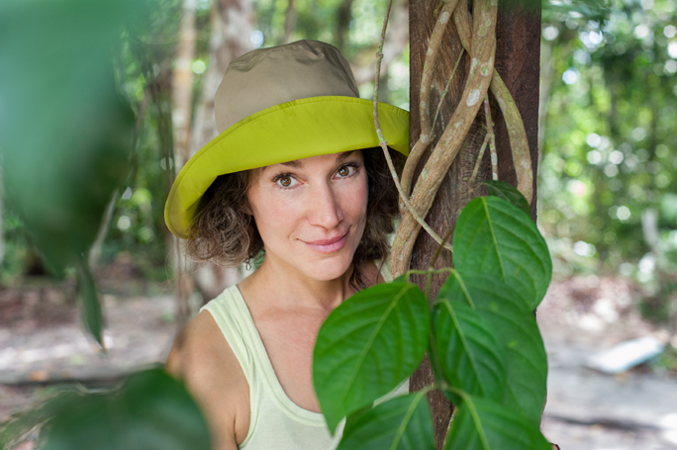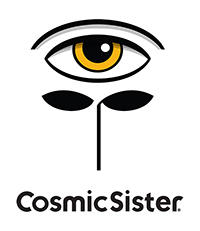Photo by Tracey Eller
This summer, I discovered psychedelic feminism, Zoe Helene, and her company, Cosmic Sister. I’m increasingly curious about journeying safely in traditional settings with natural psychedelics such as ayahuasca, cannabis, and peyote. In our journeys to find the paths we’re meant to walk and become the women we yearn to be, a safe, supportive space is momentous. I talked with Zoe Helene about psychedelic feminism and more:
When did you become a feminist?
When you’re born female in a male-dominated culture, you run up against sexist walls or barriers early on. You learn that sexism, racism, classism, ageism — all these isms — are interconnected and deeply ingrained in our socioeconomic structures and that most grown-ups value “pretty” above “brave,” “talented” “kind” or “smart.” If you’re smart, the situation seems nonsensical and can be infuriating.
Then puberty hits, you’re sexualized, and your core cultural value (even above “pretty”) is based on “sexual attractiveness” as dictated by the machine—a maddening black hole. You learn to be an emotional alchemist, transforming destructive energy into constructive action (a rite of passage). If your spirit is strong, you tap into the miracle of life, which is love, and love is hopeful.
Did you find psychedelics early on?
I was fearful of psychedelics until my early twenties because that’s what I’d been taught. Fortunately, I was a truth-seeker raised in a world where the fine arts and “high” sciences were considered allies. Naturally, I sought ways to alter my consciousness through trance and flow states via arts or meditation but never “drugs.”
What was your first psychedelic experience?
Cannabis was my first psychedelic experience. I was living with my college sweetheart, and cannabis was readily available. I “just said no” until one summer day when it occurred to me that most of the people I preferred to hang out with were cannabis enthusiasts. I tried it, and the experience was exquisite, timely and life-enhancing, a blissful tantric mind-body-spirit integration experience that lasted for hours. I wasn’t in the yoga scene at the time and hadn’t read any of the texts, so where did that come from?
Once I discovered that cannabis could be a powerful tool for exploration and self-discovery, I felt betrayed by the propaganda that had burdened me with unfounded fears. This wasn’t just a buzz; this was truly liberating. Decades later, I tried ayahuasca and again felt disappointed in my government for the same reasons.
What brought you to Psychedelic Feminism?
Psychedelic Feminism is a sub-genre of feminism that embraces the transformational power of psychedelic sacred plants. When women explore the wilderness of their psyches, they identify, observe, analyze, work with—and through — core feminist issues in fresh and exciting ways.
Women are extraordinary, and our voices are important. Women make up just more than 50 percent of the human population, 3.75 billion females! It’s time we stepped into our power, and psychedelics can help us do that. “In the medicine,” political issues become personal and vice versa. Working with psychedelics helps us make sense of unhealthy personal choices and make healthier choices in the future.
What are “sacred plants?”
Sacred plants are a category within ethnobotany, which is the study of relationship between plants and culture. Plants such as cannabis, ayahuasca and peyote are regarded with great respect and reverence because they have significant mind- and-mood-modifying properties that help people explore altered states of consciousness or non-ordinary realities.
What is ayahuasca?
Ayahuasca is a powerful combinatory hallucinogenic plant medicine brew and ceremonial ritual that has been part of Amazonian culture for thousands of years. It’s an intense journeying medicine, not a “recreational drug,” and it shouldn’t be approached lightly.
How does it work?
Ayahuasca is a transformational journey experience and an integrated mind-body-spirit approach to wellness wisdom. It’s a truth serum and a profoundly positive mirror, and it’s as much a guided experience as it is a psychedelic substance.
Sometimes the medicine comes on hard and fast, other times gently, but once “passengers” are “in the medicine,” they are able to access and communicate with their subconscious selves and “journey” in that realm. Most people experience strong, surreal “visions,” often described as lucid, waking dreams, which hold clues and messages that help them identify and remove obstacles to wellness.
Ayahuasca works in layers and levels over a period of time, and it has an uncanny way of giving you only what you’re ready for. In a safe set and setting, people find peace, empowerment, inspiration and clarity—even full-on paradigm shifts. I’ve been working with the medicine for just shy of a decade, and every ceremony has helped me move forward in profound and often unexpected ways.
What do you mean by “set and setting”?
We journey in the Peruvian Amazon, where ayahuasca originates and is legal and respected. We stay at reputable retreats and participate in ceremonies led by trained, ethical guides in a round building called a maloca that the shamans consider protected, sacred space. Ceremony is held at night after we’re prepared. When journeying with psychedelics, this type of safe set (mindset) and setting (environment) is key to having a positive experience.
What should you bring into an ayahuasca ceremony?
The most important things are clear intentions, courage, respect, integrity, humility, an open heart and mind, and, above all, a sense of humor.
What if I’m afraid? I’ve never tried ayahuasca.
A little fear, especially the first time, is normal, but if you’ve properly prepared and the set and setting feels right, there’s nothing to be afraid of. Over time you can learn to “navigate” the medicine space and take charge—to an extent—and even the most difficult ceremonies lead to buried treasure. Nothing frightening is actually taking place, and control is an illusion. Let it go, breathe deeply, focus on your intention, and you’ll be fine.
Can you tell us about your first ayahuasca journey?
My husband, Chris, and I visited the Peruvian Amazon to be part of the first Visionary Convergence in a jungle clearing. I felt safe, loved, and supported, which allowed me to go deeply into the medicine. The vision came on quickly and intensely, first taking visual cues from our physical setting, then morphing into a throbbing, surreal version of the nocturnal rainforest. On a winding path in a lush jungle, behind vines and trees on a curve ahead, I felt a powerful ancient divine feminine presence, omnipotent and pulsating radiant energy. This was one tough-love warrior goddess who believed in my potential and was not pleased. I never saw her, and I didn’t want to. She challenged me to step up to the plate. I knew she was speaking to wounds accumulated, for the most part, from the patriarchy at large. She seemed to want to show herself, and I wasn’t up for it. So I said, “OK, I hear you. I will take care of this.” She lingered, unconvinced and somewhat threatening, so I said, “You know me, so you know I keep my word.” She vanished.
When I returned home, I founded Cosmic Sister.
Was this “Mama Ayahuasca?”
Maybe, maybe not. It doesn’t matter. Maybe she was the ayahuasca plant spirit or some ancient goddess, maybe she represented the power within myself and within every woman, maybe she was my mother, grandmothers or great-grandmothers, a wise woman warrior who wanders the landscape of my inner arcadia or maybe she represented all of womankind. “All of the above” feels right.
I’m agnostic, which means I’m open-spirited but comfortable with not knowing. I can explore, guess, and even feel pretty sure about something spiritual—but that’s where I stop. Belief systems have a way of binding and blinding us.
Is ayahuasca a religion?
No. This is especially important when we’re talking about Psychedelic Feminism because many religions are inherently sexist. I’m not interested in supporting dogma, doctrine or denomination — whatever it may be —through the medicine.
Why the focus on media?
The media is a story-telling medium that plays a powerful role in shaping culture. Part of Cosmic Sister’s mission is to help with gender equity in the rapidly expanding field of psychedelics. All sorts of thinker-explorers—herbalists, ethnobotanists, anthropologists, medical doctors, psychologists, psychiatrists, artists and philosophers—are being drawn to the field, and many of them are remarkably talented women. Even so, the lion’s share of media features men, which continues to feed into the machine that created the antiquated patriarchal systems we need to rework or retire. We want you to know who the women are, what we’re working on, and why you should care.
Tell me about Cosmic Sister’s Psychedelic Feminism grants.
The original grant — the Cosmic Sister Plant Spirit Grant — is a merit-based grant for outstanding women to travel to Peru and experience an authentic, traditional ceremony in a safe set and setting.
Women of the Psychedelic Renaissance and Cosmic Sisters of Cannabis grants support women’s voices in the media. We’re helping women develop articles, interviews, presentations, photographs and other materials that educate honestly about the benefits and risks of psychedelics and cannabis from a woman’s perspective. These grants aren’t necessarily associated with the Plant Spirit Grant but often are.
How are grant recipients selected?
We’re looking for exceptional, passionate, creative women of heart and mind. We’re particularly interested in women who are solving problems, taking leadership positions and contributing to ethical evolution.
Why do you do this work?
Exploring the potential of our own inner worlds freely in whatever way we choose — including psychedelics — is a core human right. What if, through responsible exploration with psychedelics, we free our minds? Free-thinkers are more difficult to manipulate and control, which begs the question: Why are psychedelics illegal?
Julie K. Godard is a passionate writer, always thinking of ways to promote feminism and the general well-being of women. She enjoys writing about any topic currently consuming her psyche, as well as topics which reveal injustice and change in the world. Julie is concerned about cultural, societal, and gender norms and how they can be altered to drive the natural evolution of human beings across the planet. Julie’s writing has appeared in numerous short story anthologies, both horror and fiction, and she currently writes daily about the cannabis industry in Denver, Colorado. Julie believes writing, reading, and listening can change the world for the better.

